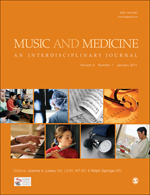Music and Medicine
Music and medicine have been intertwined throughout history, reflecting the deep connection between art and healing. This relationship spans various cultures and epochs, demonstrating the universal recognition of music's potential to influence health and well-being.
History[edit | edit source]
The history of music therapy can be traced back to ancient civilizations such as Egypt, Greece, and India, where music was an integral part of healing rituals. The Greek philosopher Plato asserted that music had a direct effect on the soul and, therefore, could be used to promote harmony within the individual. Similarly, the Roman physician Galen employed melodies to treat psychological disorders. This ancient wisdom laid the groundwork for the modern field of music therapy.
Music Therapy[edit | edit source]
Music therapy is a professional practice in which music is used within a therapeutic relationship to address physical, emotional, cognitive, and social needs of individuals. After assessing the strengths and needs of each client, qualified music therapists provide treatment that includes creating, singing, moving to, and/or listening to music. Through musical involvement in the therapeutic context, clients' abilities are strengthened and transferred to other areas of their lives.
Physiological Effects[edit | edit source]
Research has shown that music can have a profound effect on the body and mind. Listening to music can reduce heart rate, blood pressure, and anxiety in patients undergoing medical procedures. One mechanism behind these effects is the release of endorphins, natural painkillers in the brain. Music also stimulates the brain's reward centers, releasing dopamine, a neurotransmitter associated with pleasure and motivation.
Applications in Medicine[edit | edit source]
Music's therapeutic applications in medicine are diverse, ranging from pain management and improvement of cognitive function to emotional support for patients undergoing surgery or chemotherapy. In palliative care, music therapy is used to enhance the quality of life for patients with terminal illnesses. In the realm of neurology, music therapy has shown promise in the rehabilitation of patients recovering from strokes and traumatic brain injuries.
Education and Training[edit | edit source]
Professionals in the field of music therapy undergo rigorous training, typically earning a bachelor's degree in music therapy, which includes coursework in music, psychology, and medicine, as well as clinical training. Many music therapists also pursue master's or doctoral degrees in related fields.
Future Directions[edit | edit source]
As research continues to uncover the mechanisms behind music's effects on the brain and body, the integration of music therapy in healthcare settings is likely to expand. Technological advancements, such as virtual reality and personalized music streaming, offer new avenues for the application of music in medicine.
Search WikiMD
Ad.Tired of being Overweight? Try W8MD's physician weight loss program.
Semaglutide (Ozempic / Wegovy and Tirzepatide (Mounjaro / Zepbound) available.
Advertise on WikiMD
|
WikiMD's Wellness Encyclopedia |
| Let Food Be Thy Medicine Medicine Thy Food - Hippocrates |
Translate this page: - East Asian
中文,
日本,
한국어,
South Asian
हिन्दी,
தமிழ்,
తెలుగు,
Urdu,
ಕನ್ನಡ,
Southeast Asian
Indonesian,
Vietnamese,
Thai,
မြန်မာဘာသာ,
বাংলা
European
español,
Deutsch,
français,
Greek,
português do Brasil,
polski,
română,
русский,
Nederlands,
norsk,
svenska,
suomi,
Italian
Middle Eastern & African
عربى,
Turkish,
Persian,
Hebrew,
Afrikaans,
isiZulu,
Kiswahili,
Other
Bulgarian,
Hungarian,
Czech,
Swedish,
മലയാളം,
मराठी,
ਪੰਜਾਬੀ,
ગુજરાતી,
Portuguese,
Ukrainian
Medical Disclaimer: WikiMD is not a substitute for professional medical advice. The information on WikiMD is provided as an information resource only, may be incorrect, outdated or misleading, and is not to be used or relied on for any diagnostic or treatment purposes. Please consult your health care provider before making any healthcare decisions or for guidance about a specific medical condition. WikiMD expressly disclaims responsibility, and shall have no liability, for any damages, loss, injury, or liability whatsoever suffered as a result of your reliance on the information contained in this site. By visiting this site you agree to the foregoing terms and conditions, which may from time to time be changed or supplemented by WikiMD. If you do not agree to the foregoing terms and conditions, you should not enter or use this site. See full disclaimer.
Credits:Most images are courtesy of Wikimedia commons, and templates, categories Wikipedia, licensed under CC BY SA or similar.
Contributors: Prab R. Tumpati, MD


